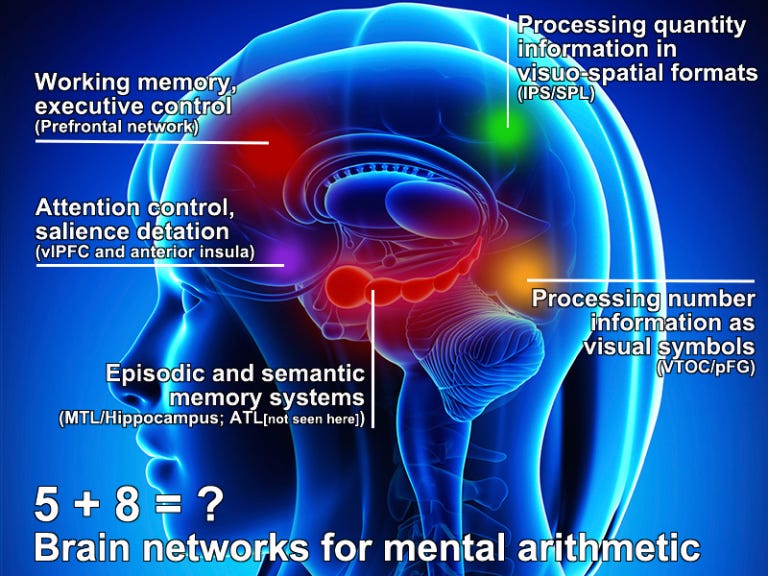We’ve all heard it before: 'I’m not a math person.' Maybe you’ve said it yourself. People think being good at math comes down to personality, or left-brain dominance, or even intelligence.
It turns out that this is a myth...
Here’s the truth: you’re not born a math person, and you’re not stuck as 'not a math person' either.
Math skills don’t come down to any of that stuff, all kids are born creative before it gets beaten out of them by modern schooling, and the key to being good at math is just not giving up.
That’s a lot to take in. Let’s break it down.
This post’s theme is: The best mindset for math.
🔒🏷️ “Fixed ability” labels
Labeling students as “gifted” or as “struggling” in math can limit their growth potential either way. Teaching kids that you either have it or you don’t — whatever it is, mind you — leads down one of two roads:
You’re ✨gifted✨ and don’t need to work too hard, so you grow complacent and lazy.
👆🏻 This was me in high school. Things got real, real quick, when grade 11 came around. Matrices? Ain’t nobody got time for that!1
You’re not gifted, so you just give up on hard things like math, leading to a lifetime of self-disappointment.
When you do get math right, it’s because you were clever (no, it’s because you tried really hard).
Okay, I’m catastrophizing here just a tad… but there’s truth in there. Particularly when students become labeled as “not math people”, they internalize this perception hardcore. Then, they lose motivation. Anxiety takes over when they face with hard things that aren’t math.
Other myth-ical labels you’ve probably heard before
“Not a creative person”— creativity isn’t some artistic trait reserved for drama class or art class, it’s a skill we’re all born with (because we’re humans) central to all problem-solving, from math to making chores fun.“Bad at sports”— athletic skill can be developed with time and practice, it’s more about finding a sport or physical activity that you enjoy.“Don’t know how to cook”— not everyone enjoys cooking, but anyone can at least nail that one recipe they really love.“Not a reader”— kids become interested in reading when they find topics that captivate them. Everyone can develop a love for reading when they find the right stories for them, but it sometimes takes a few tries.
See the common thread here? Instead of labeling our kids as “math kid”, let’s focus on sustained effort, and patience when they struggle with math. But is struggling always a bad thing?
🫨✨ Struggle promotes brain growth
Struggle is a natural part of growth. It didn’t stop when your kid was learning to sit, crawl, or walk. Back then, it was easy to see — the grunts, the falls, the effort written all over their face.
Later on, it’s harder to figure what your kid is dealing with inside their head, unless they express it loud and clear. Sometimes, it comes out as very vociferous frustration, so you’ll know, but other times, they may just give up. And with so much stuff competing for their attention these days, it’s really easy to flat out give up.

Struggle and mistakes activate brain regions associated with learning. Neuro-research shows that when learners encounter challenges, their brain gets lit up with electrical signals. These difficulty signals form neural pathways and reinforce future learning.
🧠♻️ Brain plasticity isn’t fixed, so neither are our kids
Plasticity is the brain’s ability to reorganize and form new connections. Fascinating studies of London taxi drivers revealed something remarkable: as they mastered the city’s maze of streets, their brains grew — literally! Specifically, the part associated with spatial memory expanded.
What this means for you as a “Math Parent” 👇🏼
Anyone, with sustained math practice, can develop higher-level math skills.
People are bad at math due to innate limitations from birth.
So avoid the above idea at all costs, because it will hold you and your kid back from achieving their true potential.
🙂↕️🚀 The best mindset for math
It’s known as the growth mindset. Embracing a growth mindset as early as possible helps children understand that their abilities aren’t fixed. Same as when they were toddlers learning to walk, they grow with effort, curiosity, and persistence.
When children see challenges as chances to improve rather than as a ceiling in a flooding basement, they become more resilient, confident learners (they find their own way out of the basement).
Encouraging a growth mindset at home or in class changes everything. The focus shifts from 'getting it right' to enjoying the journey. It empowers kids to face challenges head-on, celebrate progress, and look forward to the learning still to come.
See if you can tell the difference, it’s not so subtle now that you’re a Math Parent:
Well done, you got it right! So clever.’
vs.
Good job working through that problem.
Praise effort over results keeps your kid focused on learning instead of perfection.
That’s a wrap for this issue.
In the next couple issues, we’re going to talk about the rules of math and the art of the teach-back.
Many thanks to Jo Boaler and Carol Dweck for inspiring this post, and John Cena for not appearing in it.
What other math myths do you think people should ignore? Let us know in the comments.
🧐 More on the math mindset
Everyone Can Learn Mathematics to High Levels: The Evidence from Neuroscience that Should Change Our Teaching blog post by Jo Boaler
This article covers the neuroscience research supporting the idea that math ability isn’t fixed, featuring insights on brain plasticity and how struggle aids learning.
Cache Cab: Taxi Drivers' Brains Grow to Navigate London's Streets blog post by Ferris Jabr about hippocampus growth in taxi drivers.
Growth Mindset TED Talk by Carol Dweck who explains the basics of growth mindset and how we can apply it in parenting, education, and self-improvement. It’s an inspiring introduction to the impact of a growth mindset.
Mathematical Mindsets by Jo Boaler
This book dives deep into developing a growth mindset specifically for math and includes practical tips and activities for parents and teachers to encourage a love for learning math.
Mindset: The New Psychology of Success by Carol Dweck
A foundational read on the growth mindset in all areas of life, this book explains the power of seeing abilities as flexible and highlights strategies for fostering resilience and perseverance in kids.
Becoming Brilliant: What Science Tells Us About Raising Successful Children by Roberta Michnick Golinkoff and Kathy Hirsh-Pasek
This book outlines skills crucial for childhood development, including flexibility, problem-solving, and creativity, which all connect to a growth mindset approach in learning.
This is a good opportunity to address the common other math myth, will I ever use this IRL? Well, matrix multiplication is a fundamental operation in large language models (LLMs) that's used to represent words as numbers and calculate the relationships between them — basically meaning matrices are a fundamental building block of modern AI. So yes, you will use this in real life everyday!




